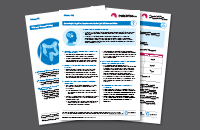 Full Guidelines
Full Guidelines
Click here to view article

 Tools
Tools


 Additional Documents
Additional Documents
Click here to see additional documents

The CTFPHC released the “Recommendations for prevention of weight gain and use of behavioural and pharmacologic interventions to manage overweight and obesity in adults in primary care” in 2015.
The task force recognizes that this guideline is currently out-of-date and has made a decision to “sunset” (archive) these recommendations. This was based on a review of the current evidence following the https://canadiantaskforce.ca/methods/updating-reaffirmation-and-sunsetting-clinical-practice-guidelines-methods-from-the-canadian-task-force-on-preventive-health-care/ methodology.
The decision to sunset the guideline was due to the following changes:
- The evolving concept of obesity as a health issue (e.g., risk factor vs chronic disease or disorder) and resultant impact on selecting appropriate health outcomes
- Substantial development in obesity treatment including pharmaceutical and surgical interventions that are beyond the scope of the Task Force mandate on preventive health care
- Availability of a comprehensive Canadian guideline on obesity in adults
The task force acknowledges the importance of this topic to the health and wellbeing of Canadians. During future topic selection, we may re-evaluate aspects of this topic that are better suited to the Task Force mandate.
Summary of recommendations for clinicians and policy-makers
Recommendations
Measurement of BMI
These recommendations apply to apparently healthy adults ≥ 18 years of age who present to primary care. These recommendations do not apply to people with eating disorders, or who are pregnant.
- We recommend measuring height, weight and calculating BMI at appropriate primary care visits.
(Strong recommendation; very low quality evidence)
Prevention of weight gain
These recommendations do not apply to people with eating disorders, or who are underweight, pregnant, overweight or obese (Body Mass Index [BMI] ≥ 25).
- We recommend that practitioners not offer formal, structured interventions aimed at preventing weight gain in normal weight adults.
(Weak recommendation; very low quality evidence)
Management of overweight and obesity
These recommendations apply to adults ≥ 18 years of age who are overweight or obese (25 ≤ BMI < 40). Pregnant women and people with health conditions where weight loss is inappropriate are excluded. These guidelines do not apply to people with BMI ≥ 40, who may benefit from specialized bariatric programs.
- For adults who are obese (30 ≤ BMI < 40) and are at high risk of diabetes, we recommend that practitioners offer or refer to structured behavioural interventions aimed at weight loss.
(Strong recommendation; moderate quality evidence) - For adults who are overweight or obese, we recommend that practitioners offer or refer to structured behavioural interventions aimed at weight loss.
(Weak recommendation; moderate quality evidence) - For adults who are overweight or obese, we recommend that practitioners not routinely offer pharmacologic interventions (orlistat or metformin) aimed at weight loss.
(Weak recommendation; moderate quality evidence)
Additional Documents
-
Protocol (pdf)
- Prevention Systematic Review (pdf)
- Treatment Systematic Review (pdf)
- Maintenance Supplementary Report (pdf)
- Published Systematic Review
- Prevention List of Excluded Studies (pdf)
- Treatment List of Excluded Studies (pdf)
- CMAJ Author Podcast
- Guideline Presentation



